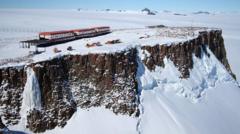The Sanae IV research station, located in the harsh conditions of Antarctica, is currently facing turmoil as allegations of assault and troubling behavior among team members have surfaced. This small team of nine South African researchers was set to spend an extended winter season at the station, situated approximately 170 kilometers from the ice shelf.
Following a statement from a spokesperson for the South African government, it was confirmed that an assault occurred at the research base, prompting urgent reactions from the South African environment ministry to the concerns raised. The ministry is actively investigating the allegations while reiterating that initial assessments of the team members, including background and psychological evaluations, were all successfully passed.
Reports emerged that some team members expressed a desire to be evacuated from the challenging environment after receiving alarming communications regarding a colleague's behavior. Meanwhile, investigations into allegations of sexual harassment are in progress; however, officials have noted that claims of sexual assault are incorrect. They affirmed that the accused individual has cooperated with psychological consultations and has expressed remorse.
The nature of life at Sanae IV, which can isolate staff for prolonged periods of time due to extreme weather conditions, brings unique social challenges. Conditions at the base can create an environment where interpersonal conflicts may escalate from minor irritations into significant disputes, often exacerbated by the stress of isolation.
Experts have pointed out the psychological strain that can emerge in such confined and isolated settings, suggesting that small disagreements over responsibilities or even personal habits can become major points of contention. The situation at the station continues to evolve, with authorities monitoring the wellbeing of the research team.
In past years, incidents in Antarctic research stations have been rare, although not unheard of, with reports from 2018 involving violent altercations. As South African officials prepare to respond appropriately, they remain focused on ensuring a safe and cooperative atmosphere for the scientists stationed in one of the world's most remote settings.
Following a statement from a spokesperson for the South African government, it was confirmed that an assault occurred at the research base, prompting urgent reactions from the South African environment ministry to the concerns raised. The ministry is actively investigating the allegations while reiterating that initial assessments of the team members, including background and psychological evaluations, were all successfully passed.
Reports emerged that some team members expressed a desire to be evacuated from the challenging environment after receiving alarming communications regarding a colleague's behavior. Meanwhile, investigations into allegations of sexual harassment are in progress; however, officials have noted that claims of sexual assault are incorrect. They affirmed that the accused individual has cooperated with psychological consultations and has expressed remorse.
The nature of life at Sanae IV, which can isolate staff for prolonged periods of time due to extreme weather conditions, brings unique social challenges. Conditions at the base can create an environment where interpersonal conflicts may escalate from minor irritations into significant disputes, often exacerbated by the stress of isolation.
Experts have pointed out the psychological strain that can emerge in such confined and isolated settings, suggesting that small disagreements over responsibilities or even personal habits can become major points of contention. The situation at the station continues to evolve, with authorities monitoring the wellbeing of the research team.
In past years, incidents in Antarctic research stations have been rare, although not unheard of, with reports from 2018 involving violent altercations. As South African officials prepare to respond appropriately, they remain focused on ensuring a safe and cooperative atmosphere for the scientists stationed in one of the world's most remote settings.























